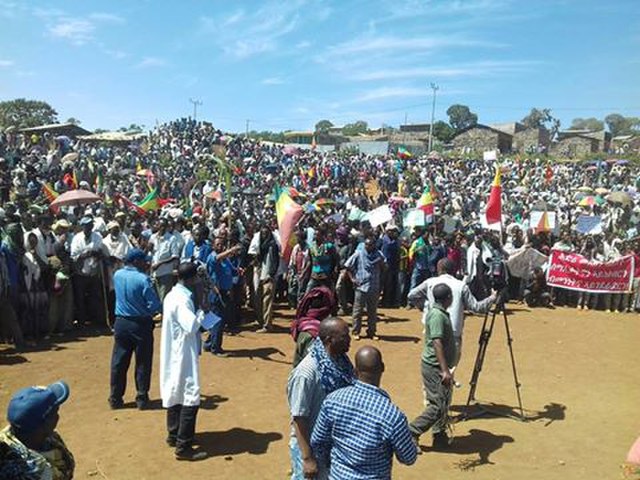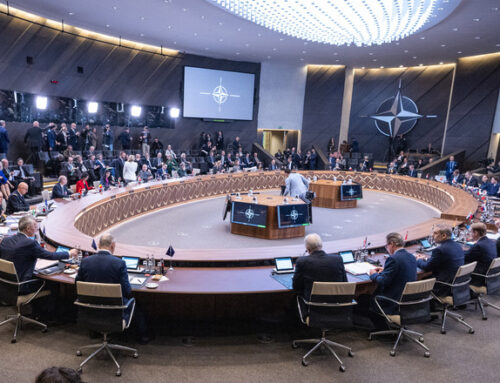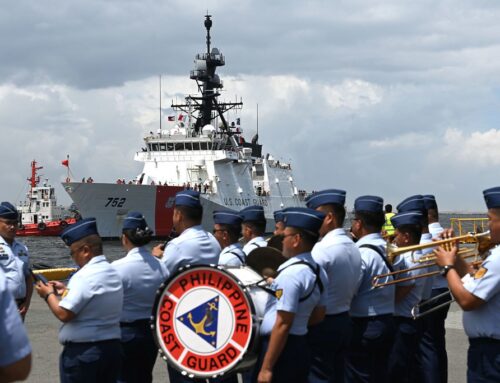PULASKI COMMENTARY Tigrayan Peace Process Can We Count On Lasting Changes In The Horn Of Africa Dominika Kulig
Autor foto: Domena publiczna

PULASKI COMMENTARY: Tigrayan Peace Process – Can We Count On Lasting Changes In The Horn Of Africa? (Dominika Kulig)
1 grudnia, 2022


PULASKI COMMENTARY Tigrayan Peace Process Can We Count On Lasting Changes In The Horn Of Africa Dominika Kulig
Autor foto: Domena publiczna
PULASKI COMMENTARY: Tigrayan Peace Process – Can We Count On Lasting Changes In The Horn Of Africa? (Dominika Kulig)
Autor: Dominika Kulig
Opublikowano: 1 grudnia, 2022
Little has been said in the mainstream media about the situation in Tigray, even though it is one of the bloodiest conflicts and the worst humanitarian disasters of modern times. The fights between the Ethiopian National Defence Force (ENDF) and the Tigray People’s Liberation Forces (TPLF), which has been ongoing since November 2020, are estimated to have killed between 385,000 and half a million people so far, although these figures are only rough estimates. The total information blockade, which covers the region, does not allow to obtain reliable data. From the witnesses’ statements, we know that the course of the conflict was extremely brutal, and both sides committed atrocious war crimes, mainly against women and children. On November 2 2022, a decision was made to cease fire between the warring parties. Can one therefore count on lasting peace in this part of the Horn of Africa?
Context And The Course Of The Conflict
Tigray itself, the mineral-rich cradle of the Abyssinian Empire, is in a difficult geopolitical position. As the northern part of Ethiopia (where the Tigrayans are a minority) it borders to the north with hostile Eritrea. The country seceded from Ethiopia in 1993[i] and five years later started a border conflict, which (although it ended in 2000) resulted in bitter relations between two countries. During this period, the Tigrayans held considerable political influence in the Ethiopian government led for three decades by the Ethiopian People’s Revolutionary Democratic Front (EPRDF). The situation changed after Abiy Ahmed[ii] came to power in 2018, when the influence of the Tigrayans was significantly weakened, and they were labelled by the new government as a terrorist organisation. Dissatisfied with the government’s efforts to centralise power[iii], they held a referendum in an attempt to maintain broader autonomy. In November 2020 the federal government accused the TPLF of attacking its military base and launched an offensive. Since then, federal troops together with militias from neighbouring Amhara region and the Eritrean military forces have led to the escalation of the bloody conflict, creating a humanitarian disaster with tens of thousands of starving and internally displaced people. The region was cut off from supplies and services provided by the government in the rest of the country. According to Amnesty International and other aid organisations, the fights were accompanied by an exceptionally cruel scale of sexual violence and a wide repertoire of war crimes. With time, the conflict that seemed to be political in its roots began to turn into ethnic cleansing affecting minority both within the region and in the rest of the country. This, in turn, only strengthened Tigrayans separatist movements. Although during the conflict Ethiopia was repeatedly called on to cease military activity and allow the access of humanitarian aid, most of the time it remained deaf to the appeals of the international community.
Peace Talks
Starting summer this year, the TPLF began showing the will to negotiate a ceasefire. Also on the part of the government we were able to hear about similar needs, which slowly began to build hope for an improvement of the situation. Initial attempts, however, failed over the choice of mediators. The Ethiopian government proposed the mediation of Olusegun Obasanjo, representing the African Union (AU), which the Tigrayans – who requested Uhuru Kenyatta’s mediation – did not want to agree to. The reason for this situation was the lack of trust in both the AU and its envoy, who had previously legitimised the undemocratic elections in the country and did not oppose Abiy Ahmed’s decisions concerning the involvement of governmental army during the conflict. However, due to the deteriorating humanitarian situation, at the end of October 2022 in Pretoria peace talks finally began – under the auspices of the African Union and with mediations of both proposed politicians. As a result, on November 2, an agreement on a permanent ceasefire was signed.
Later, on the weekend of November 12-13, an agreement was made to implement the plan to end the conflict. Both sides agreed on cessation of fighting (during signing the fights were still going on), disarmament of the TPLF and the decision to lift the blockade and allow humanitarian aid, the first shipment of which was delivered on November 15. This was pointed as a crucial challenge at this point, as the area is devastated and the people living there have been cut off from their livelihoods for a long time.
What Does It Mean To The Regional Dynamics?
Until the outbreak of the war in 2020, Ethiopia provided shelter to refugees from other African countries, especially from conflict-ridden Somalia. The Prime Minister of Ethiopia himself, Abiy Ahmed, in 2019 received the Nobel Peace Prize in recognition of the changes he introduced after taking the position, which was i. a. freeing political prisoners, abolishing censorship and signing an agreement with the president of previously hostile Eritrea. At that time, it seemed that Ethiopia had the predisposition to become an – more reliable than other countries – stabilising force in regional security and thus a reliable partner for foreign decision-makers and political partnerships. However, all hopes associated with these changes were soon dashed when it turned out that the federal government had imposed a blockade of resources and information in Tigray and used peaceful relations with Eritrea to strengthen the alliance against minorities, which had the hallmarks of brutal ethnic cleansing. The decisions made by Abiy Ahmed since 2020 have harmed not only the Tigrayans, but also the rest of the country – destabilising it, financially burdening it with the costs of the conflict[iv] and undermining its credibility on the international arena.
The reality of the situation was also a test for the African Union, which in theory should provide the tools for the African security architecture. The peace process that has been launched has shown that, although AU is able to play a role as a mediator, its effectiveness and credibility leave much to be desired and is not a strong enough mechanism on its own. One should keep in mind that wherever such weakness is revealed, other external actors appear, trying to pursue their interests. In this case, it is Russia, who willingly sided with Abiy Ahmed, for which he repays Moscow with mutual sympathy.
Is Peace A Real Option?
Although the agreement currently being implemented is the first step on the path to real peace, it may turn out to be a long way, and optimism should not blind us. The practice so far has shown that the government’s settlement statements (regarding i.a. permission and support for humanitarian aid) were not reflected in practice. Attempts to cease the fire had already taken place last year, but their implementation failed.
Taking into account what we know from the peace talks so far, attention should also be paid to other potential threats to the stabilisation in the region. The very fact that the TPLF agreed to the terms of the federal government, including complete disarmament, indicates that it was in a dead end situation and the argument of force was put at the foundation of the whole process. Thus, the sources of the conflict were not resolved, but only suppressed. After all, it is hard to believe that an armed conflict would not contribute to greater reluctance and feeling of rightness of separatist side.
It is also worth remembering that the talks did not include either the topic or the voice of Eritrea, which had a significant impact on the escalation of the conflict by participating militarily on the side of the Ethiopian government troops. In addition, there are still unresolved territorial disputes with the armies of other provinces,
[v]
such as the one with neighbouring Amhara.
Finally, there is the issue of accountability for the crimes committed. And here the situation does not leave much hope. First of all, the federal government had already made sure to prevent the documentation of the conflict by limiting access to the region for the media and aid organisations. The UN presented the initiative to establish a commission to investigate war crimes in Tigray, and even though it’s a right and particularly important move it has not yet come to fruition[vi] and it does not look like it will happen in the near future. Without this instrument (which would make it possible – even if to a small extent – for fair accountability and bringing war criminals to justice) not only will the perpetrator’s conviction of impunity be strengthened. It will also make it difficult to find the foundations for a lasting peace which cannot be done on festering wounds. And as one could see in the past – resentments are a constant component of recurring conflicts.
Author: Dominika Kulig, Casimir Pulaski Foundation
[i] After the years of Eritrea being colonized by Italy, in 1952, the United Nations decided to hand over its territory to Ethiopia on the basis of an autonomous province. Autonomy was revoked in 1962, leading to increased separatist movements and conflict with the Ethiopian government.
[ii] Abiy Ahmed Ali is a politician from the Oromo (the largest ethnic group in Ethiopia), who has been the Prime Minister of Ethiopia since 2018. He’s the creator of numerous reforms leading to economic and moral liberalization in the country, as well as the peace process with Eritrea. In 2019, he was awarded the Nobel Peace Prize.
[iii] Ethiopia’s political system is based on the principle of ethnic federalism with 11 provinces.
[iv]These costs also include sanctions imposed by the Biden administration on the Ethiopian army in 2021.
In Ethiopia, each province has its own militia.
[vi] One of the countries that voted against the creation of the commission was Russia.






